What qualities make a comic or graphic novel linger in the genre’s memory? Which comics of 2000-2014 will we still be reading and discussing in 2064?
This was the subject of a panel at the recent LonCon, at which, comics authors Maura McHugh, David Baillie and Hannah Berry, publisher John Anderson, and comics enthusiasts Adam Rakunas and myself discussed the famous, the obscure, the deserving, and the overhyped in the last fifteen years of international comics publishing. We also looked back at comics from 50 years ago, to see what qualities have helped past titles stand the test of time.
Before I list our suggested comics, I want to review our look at comics from fifty years ago. Any guess at a future canon is particularly challenging in a medium so dominated by the fast-flowing rush of whatever is the new “big thing.” Even in the initial list proposed in the panel description. Y: The Last Man (2002-2008) was the notable exception to a selection saturated with extremely recent series, Saga (2012-present), The Wake (2013-2014) and Image comics’ Lazarus (2013-present), plus two refreshed in public memory by recent translations and adaptations, Snowpiercer (Le Transperceneige, 1982) and Attack on Titan (2009-present). Already in 2014, works of 2000 to 2010 are being eclipsed. Yet short-term success or obscurity don’t necessarily translate to the long-term.
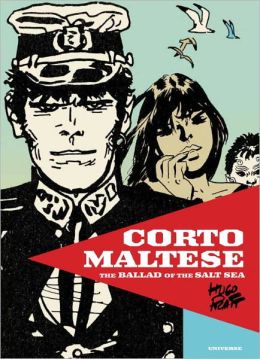
For one, there are several different ways a comic can circulate fifty years after its release. Very few works from 50 years ago are still commonly read and enjoyed the way we read new ones: Italy’s Corto Maltese (Hugo Pratt, 1967) and Japan’s Astro Boy (Osamu Tezuka, 1952-68) are standard stock for every bookstore in their native countries, and common in translations around the world, yet it is common for lists of top 50 graphic novels (especially those concentrating on English language works) to include nothing from before the later 1980s.
When I run across older works on bookstore shelves, they are most often nostalgia anthologies, works like early Mickey Mouse and Donald Duck comics, collected Punch or early Batman. These flourish in present publication, but are aimed, not at new readers, but at collectors who already love the characters, or at comics enthusiasts interested in the history of the genre, classic characters, or the evolution of sequential art. It is impossible to say whether such titles will survive over multiple generations.
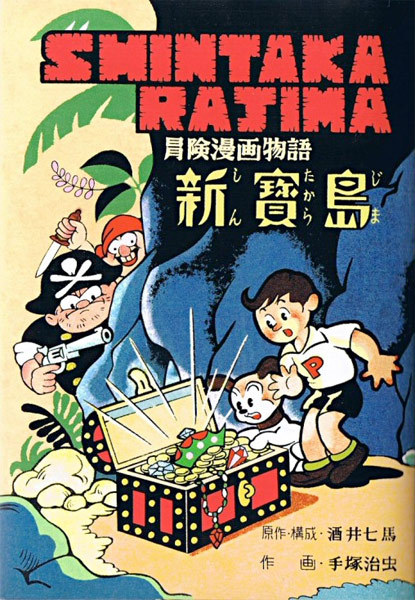
Other titles, including many we consider seminal and still important, survive as footnotes in histories of comics but are rarely actually read. In my own work on manga history, I see critics constantly mention Osamu Tezuka’s first full-length published work New Treasure Island (1947, available in Spanish, not yet English), which was the vanguard of the post-WWII manga boom, inspiring and shaping the new age of post-war modern manga. Yet, when histories of comics talk about it, they inevitably discuss how it initiated the “cinematic style” and include one of three stock pages as an example, but never discuss its overall story, making it clear that even many experts in the field have never bothered to read it cover-to-cover. We acknowledge it as an important early example, but prefer to read, enjoy and remake the more mature stories of the same type that have aged better, like Metropolis and Astro Boy.
Thus, when considering how current top titles may be remembered in fifty years, I see it as a separate question which titles may still be read in full, which may be read only by specialists, and which may survive only in footnotes as the initiators of trends of which we prefer to read later examples. For example, Attack on Titan is currently huge, and deservedly so, in my opinion, because it got great power out of its trick of hybridizing the genres of mehca and survival horror, which (within manga at least) each have very rigid stock narrative structures, so the hybrid constantly betrays the reader as it switches from one formula to the other, shocking and surprising us and breathing new vividness into the familiar.
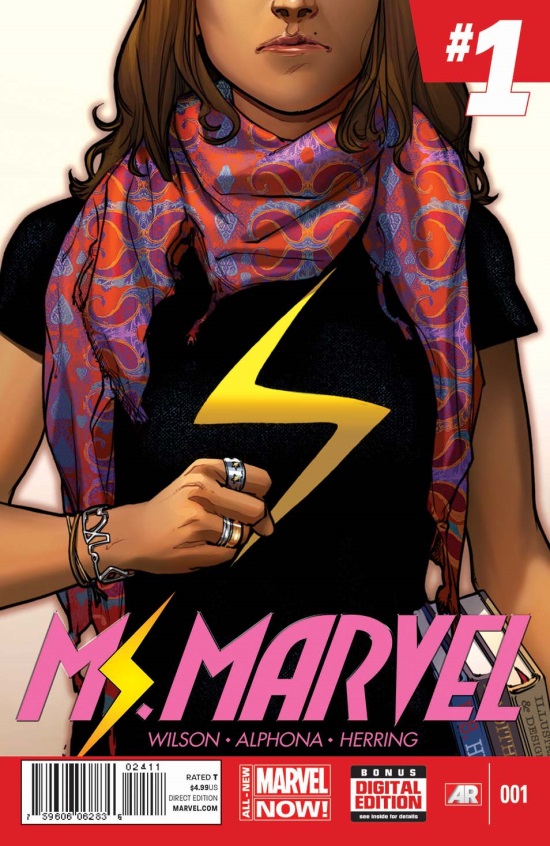 Yet this technique has already been picked up by Knights of Sidonia which triple-mixed mecha and survival horror with space opera, so who is to say whether Attack on Titan will be remembered for itself or for some other work which will come in the next decade for which it was the enabling footnote. In an odd sense, this kind of eclipsing is, for the broader genre, a good thing, since it means other titles have done even greater things than the original; I, like many, am delighted by the progressive move Marvel comics has taken in the new Ms. Marvel, Kamela Kahn, a Pakistani-American Muslim, but I will be even happier if she becomes a mere footnote, eclipsed by more and more mainstream comics titles focusing on such diverse protagonists.
Yet this technique has already been picked up by Knights of Sidonia which triple-mixed mecha and survival horror with space opera, so who is to say whether Attack on Titan will be remembered for itself or for some other work which will come in the next decade for which it was the enabling footnote. In an odd sense, this kind of eclipsing is, for the broader genre, a good thing, since it means other titles have done even greater things than the original; I, like many, am delighted by the progressive move Marvel comics has taken in the new Ms. Marvel, Kamela Kahn, a Pakistani-American Muslim, but I will be even happier if she becomes a mere footnote, eclipsed by more and more mainstream comics titles focusing on such diverse protagonists.
This differentiation of what is read from what is remembered as a footnote is enhanced, in comics and elsewhere, by canon formation, and the tendency of people to say, “If you only read one example of X read this one.” Just as English classes typically assign Tess of the d’Urbervilles and Moby Dick in preference to other Hardy or Melville, so in fifty years’ time reading conventions will likely have settled on one canonical graphic novel to represent Jill Thompson, Grant Morrison, Maurício de Sousa, Moebius (Jean Giraud), Neal Gaiman etc.
As one of my fellow panelists pointed out, in the case of Alan Moore, we can’t be certain Watchmen will become the stock example not some other work. Revolutionary as it is, Watchmen is so closely tied to its Cold War context that the authors of the movie script already felt it necessary to add a more modern environmentalist subplot to make it more approachable for modern teens, while future generations of readers may prefer From Hell, which is more temporally independent, or V for Vendetta, which has such a conspicuous place in current politics thanks to protestors adopting its Guy Fawkes mask. For all we know, that mask could survive past everything, as ancient Roman comic and tragic masks are recognized by many modern people who don’t have any idea where they come from; or the V mask could be forgotten, like the many other masks of ancient Rome of which only classicists can name.
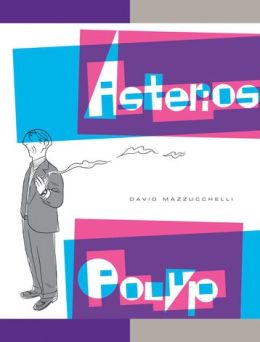
Our discussions in the panel yielded lists of several different kinds of exciting recent titles or comics creators which we think might be remembered, for different things and in different ways. I will list here those which came up on the panel, but please keep in mind that these are examples, not intended to be comprehensive or exclusive. If you have more suggestions, please add them in the comments, especially examples of works from outside the English-speaking world, since our all-Anglophone panel naturally had more access to English-language comics.
We discussed the question of exciting and promising authors who seem certain to leave their mark, but who haven’t yet written one specific work which seems likely to rise above the others. One could tell by 1965 that Osamu Tezuka and Stan Lee were giants of the comics world, but not yet which of their many creations would still be on lunchboxes in 2015. Excluding the most obvious (since it is obvious to anyone that One Piece and Naruto will be remembered at least as footnotes in 50 years), here are some suggestions for current artists and authors many of us are keeping an excited eye on:
- Becky Cloonan, an illustrator who, among many other titles, worked with author Brian Wood on Demo (2010) and Channel Zero (2003).
- Brandon Graham developed out of graffiti art through some pornographic work to write titles such as Escalator (2005) and Image’s Prophet (2012-).
- Junji Ito is continuing to push the boundaries of horror manga, and may soon be expected to surpass his previous best-regarded work Uzumaki. (More about Ito.)
- Paul Pope, repeated Eisner award winner, known currently for Batman: Year 100 and Battling Boy among many other titles.
- World Fantasy Award winner Shaun Tan has produced numerous powerful works whose lush storybook style make them appeal to mainstream as well as comics readers; The Arrival (2006) has circulated most, but it is hard to say which may become the canonical example.
- Naoki Urasawa is an internationally acclaimed manga artist whose works have grown increasingly ambitious in the last decades (especially those written in collaboration with Takashi Nagasaki), including such titles as 20th Century Boys (1999-2006), Pluto (his stunning adaptation of the darkest story arc of Tezuka’s Astro Boy; 2003-2009), and now the ongoing Billy Bat (2008-).
- Fumi Yoshinaga was the first comics artist honored by the Tiptree awards, for her powerful feminist secret history ?oku (2005-), and thanks to that fame more of her titles, such as What Did You Eat Yesterday? (2005-) and her autobiographical one-shot Not Love But Delicious Foods Make Me So Happy are receiving international recognition.
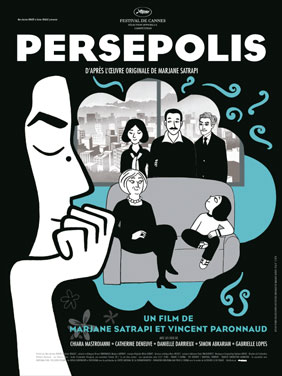
We also discussed, as extra-likely to survive, those comics that treat literary, political, artsy, highbrow or other subjects of types considered especially respectable by the literary mainstream. Art Speigelman’s Maus, Keiji Nakazawa’s Barefoot Gen and Vittorio Giardino’s A Jew in Communist Prague have demonstrated how even the most elitist 20th century critics were won over by treatments of the century’s great traumas. Literary and political interest far outside the realm of comics readers can help keep such titles in print for decades. So far the 21st has yielded several similar works:
- Persepolis, by Marjane Satrapi (2000-2003), an autobiography about a young woman’s life in Iran.
- Town of Evening Calm, Country of Cherry Blossoms by Fumiyo Kono (2003-2004), is a treatment of the long-term aftereffects of exposure to the Hiroshima bomb, joining Shigeru Mizuki, Osamu Tezuka, Hideshi Hino, Keiji Nakazawa and many others who have used manga to critique and express the Japanese experience during WWII.
- Mom’s Cancer (2005) by Brian Fies, is another award-winning autobiography treating a common dark facet of modern life, and probably more likely to enter long-term than his more recent touching treatment of the slow pace of recent social progress, Whatever Happened to the World of Tomorrow?
- Sally Heathcoate: Suffragette, by Bryan Talbot, Mary Talbot and Kate Charlesworth, certainly treats the kind of popular mainstream progressive subject which could let it eclipse Bryan Talbot’s many other more traditional comics titles, and even his earlier joint venture with Mary, Dotter of Her Father’s Eyes.
- Footnotes in Gaza (2009), The Fixer: A Story from Sarajevo (2003), Palestine (1996), and The Great War (2013), his wordless depiction of the opening of WWI.
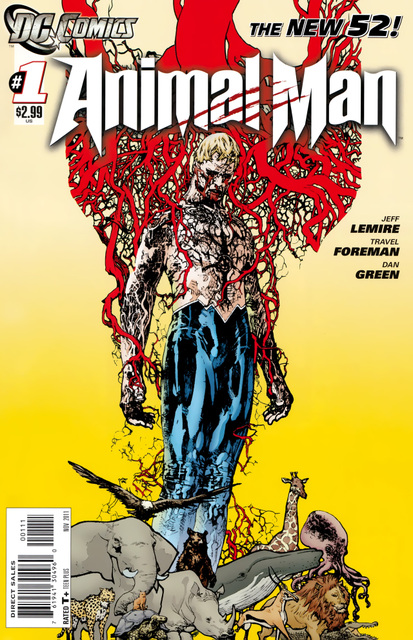
Another category are the more imaginative and transformative examples of titles within the comics mainstream, variations on superhero titles, adventure comics and others coming from Marvel, DC, Vertigo or Image, which enjoy dominant positions on the shelves of corner comics’ shops. Among the more inventive of these in recent years have been All Star Superman (2006-2008), Superman: Red Son (2003), Saga (2012-), Y: The Last Man (2002-2008), Ex Machina (2004-2010), recent Hawkeye, Animal Man and Doom Patrol (20), and the long-awaited “Silver Agent” arc of Astro City.
Another very different group are those producing more stylized specialist comics, especially radical and underground comics artists, exciting for how they use the stylized medium of graphic narrative, and push boundaries. Many of these are medium-obscure today, known mainly to serious comics aficionados, but that type of notoriety may be more likely to last when the bulk of casual readers have moved on to the new big thing. For example, Junko Mizuno produces gruesome hyper-cute stylized works (imagine My Little Pony x Titus Andronicus); she works slowly, but her recent Little Fluffy Gigolo Pelu (2003-2005) is already trying more ambitious things than her previous longest work Pure Trance (1998), and it is reasonable to expect that her most ambitious works lie ahead.
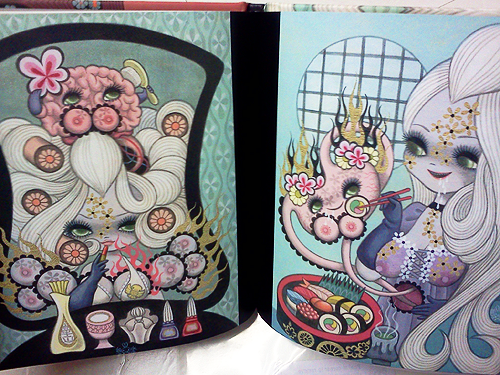
Similarly, Yuichi Yokoyama is pushing the boundaries of extreme abstraction in works like Garden, fascinating but definitely only for those already deeply interested in comics art, and Asumiko Nakamura’s recent work, especially her two color printed pieces like Piano, have pushed the aesthetic boundaries of gothic manga, but no one work of hers has risen to prominence or received international attention. And in Western comics, now that Larry Marder is doing less administrative work for Image Comics he is finally working on finishing his minimalist anthropological/cultural epic Beanworld, and the final volumes seem likely to be the most powerful.
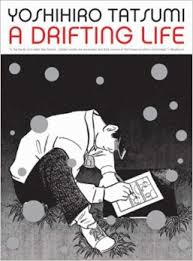
Also extra-likely to last at least on the shelves of serious comics readers are comics about comics, i.e. that treat the history and construction of comics from the inside, which comics enthusiasts and critics will always need as references. For example, Scott McCloud has followed his earlier seminal Understanding Comics (1993) with Reinventing Comics (2000) and Making Comics (2006), all references likely to be consulted by comics critics for many decades to come. On the Japanese end, Yoshihiro Tatsumi’s A Drifting Life (2008) documents the development of post-WWII manga, especially gekiga.
Other titles brought up by panelists over the course of our discussion included:
- Alex Robinson’s Box Office Poison
- Ursula Vernon’s Digger
- Craig Thompson’s Blankets
- Jeff Smith’s Bone
- Joe Hill & Gabriel Rodriguez’s Locke & Key
- David Mazzucchelli’s Asterios Polyp
- Joe Matt’s The Poor Bastard
- Stan Sakai’s Usagi Yojimbo
- Gareth Brooks, various
- Seth (Gregory Gallant), George Sprott and Clyde Fans
- Mike Carey & Peter Gross’s The Unwritten
- Ed Brubaker & Sean Phillips, Criminal, also Fatale
- Phonogram
- Chris Ware’s Building Stories and Jimmy Corrigan: The Smartest Kid on Earth
- Jason (Jason Arne Sæterøy) works including I Killed Adolf Hitler, and Hey, Wait…
- Various innovative works published by Soaring Penguin Press
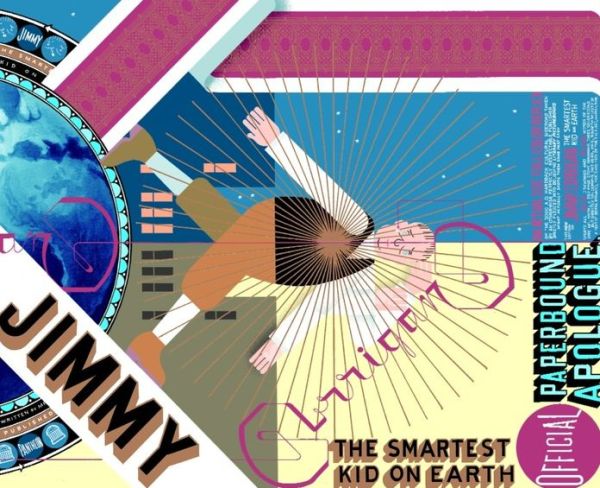
These names are the result of brainstorming rather than systematic thought, a quick picture of what six people who try to keep up with comics as best we can could come up with in an hour. If you have more to add, works or artists you think may survive either in common readership or in footnotes in 2064, please post a comment.
Ada Palmer is an historian, who studies primarily the Renaissance, Italy, and the history of philosophy, heresy and freethought. She also studies manga, anime and Japanese pop culture, and has consulted for numerous anime/manga publishers. She writes the blog ExUrbe.com, and composes SF & Mythology-themed music for the a cappella group Sassafrass. Her first novel is forthcoming from Tor in 2015.










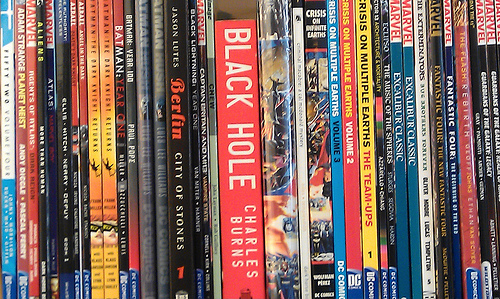
I’d be surprised if Über doesn’t get remembered, given the subject matter and how it is handled. I think it is going to be a slow burner though, it’ll take a few years to get the recognition in the mainstream. Its not a comfortable read though. Basically, What-If the Nazis managed to create people with super powers. It shows the methods they might use to do so, the effect it would have on the War Efforts of the Allies, the response of the Allies and the lengths they’d go to in return, and the human damage it does to everyone in contact with it.
It got a lot of flack at first because a lot of the knee-jerk responses over the first few issues was Nazi-Superpower Glorification, but as the story has unwound that is just been so unpacked and unpicked in-story. There is no glorification here, just a horrible tale of What-If the bad guys got superpowers first.
I think that the Waid/Weiringo run and Jonathan Hickman’s runs on Fantastic Four have a good shot to be remembered in 50, the same way we still remember the Stan and Jack run and John Byrne’s.
All-star Superman will likely continue to be considered the masterpiece it is. I wouldn’t be surprised if morrison’s Batman run stands the test of time.
I can tell you that if I’m alive in 50 years, I’ll be re-reading JSA, Exiles, and the Busiek/Perez Avengers every few years.
Here is the issue with what Marvel is doing, or as the writer puts it being “progressive.”
Marvel is going PC simply to go PC. They are not doing it for any other reason than to attract attention and sell books. It means nothing.
Does anyone really think that Falcon will continue on as Capt. America? Does anyone really think Thor will continue being female? Does anyone really think that Ms. Marvel will go on beyond a certain number of issues?
No. This is all publicity and it means nothing more than that.
Books that are to be remembered, are remembered for MUCH more than how PC or “progressive” they are.
There is something about them that goes BEYOND politics and the political climate. They may be about politics, but there is something to be said for writing and characterization and art. There is something to be said for how it hits the reader; for how it does not feel fake and contrived. How it goes beyond whatever it is about and stays in that readers memory and soul.
@3
Wow, it is almost like they are a business, and are trying to reach new markets. How dreadful of them to dare to be socially literate of them to do that. I bet no one ever made great art just for grubby business readings before. /sarcasm
@3: I assume, then, that you have bought all the issues of Ms. Marvel, and are already familiar with the still-unpublished stories about the new Captain America and the new Thor. Please describe for us their failures of writing and characterization and art, and tell us the details of how those particular stories are fake and contrived.
There will always be great stories and dumb stories. There are great stories and dumb stories about straight white men, and great stories and dumb stories about people who AREN’T straight white men. “White maleness” and “lack of white maleness” are not the REASONS for a story’s greatness or crappiness. So when you jump the gun and suggest that certain Marvel stories can’t possibly be any good BECAUSE they feature nonwhite/nonmale people, you’re saying more about yourself than about Marvel.
I came here to say All-Star Superman as well. I think long after the pointlessly grim Man of Steel is erased from our cultural conversation as a sad decline back into the Dark Ages of the 90s forced “grim n’ gritty” machismo, All-Star will remain the seminal work of The Man of Tomorrow that people reference when they are writing about 100 years of Superman in a few decades. & frankly, that makes me really optimistic for the future. Which is what Superman is supposed to do.
@5: Going PC for the sake of it doesn’t necessarily mean a work will be fake and contrived. But it’s one more reason why it might be…
7. Gerry__Quinn
Quite honestly, at this point it is the preponderance of banal straight white male superheros that is seeming contrived & false. It doesn’t reflect the real world & just ends up being pathetic pandering to a loud, stagnant demographic. Heck, if anything, as a straight white male I’m pretty offended by the sort of nu-90s garbage that is being marketed to “me.”
@mordicai, yes, I agree the optimism of All-Star Superman is wonderful against a background of so much dark and grit in the more ambitious recent titles, especially superhero comics. I love Astro City for much the same reason, depth combined with optimism and a love of life and people as well as of comics, that makes me feel like I’m reading Astro Boy for the first time again.
As for the question of what Marvel is doing right now with Ms. Marvel etc., I think only time will tell which titles and characters are tokens and which are genuinely part of exciting changes, but I’m always one for hope. The early issues seem promising, and, after all, in these big comics universes, even something that starts out weak, or is created as a token or afterthought, can be transformed by a new creative team into something great later on, as we’ve seen before in titles like Marvels and Thunderbolts. Even if the woman who’s becoming Thor stops being Thor, she could go on to become something else even better.
@7: “Going PC for the sake of it doesn’t necessarily mean a work will be fake and contrived. But it’s one more reason why it might be…”
Interesting that you think telling stories about women and darker-skinned people is “going PC.” Is there a special ancient rulebook that says that stories about straight white men are “normal,” and anything else is just attention-grabbing?
The color or gender of a character has NO bearing on the quality of the story. The answer to “why is this character female or nonwhite?” is: “why not?”
Glad to see some manga included in this list, though surprised at the lack of love for Hiroumo Arakawa’s Fullmetal Alchemist (ended 4 years ago and has a fandom that’s still going strong and is itself pretty influential.) In terms of western comics, one I’m surprised to see not mentioned at all is Hellboy, which I certainly think’ll be remembered for some time, at least the movies, which I quite love. Oh well, probably just too many titles to consider…
@8: “banal straight white male superheros” … “a loud, stagnant demographic” … but it’s others who display prejudice?
@10: I was replying to @5, who was replying to @3. It was postulated that Marvel were “going PC for the sake of it”. Clearly my point does not apply if the reason for a particular choice of character comes from criteria relevant to the story, or the writer’s ability to tell it.
Frankly, I’m shocked no one mentioned Bill Willingham’s Fables, both one the most popular and most acclaimed Vertigo titles of the last decade. I don’t see any reason why it wouldn’t last.
With regard to Grant Morrison, I would expect All-Star Superman to last a bit better than his Batman stories, even though they’re fantastic, simply because his Batman run is large, sprawling and complex, while All-Star Superman is a single condensed dose of everything that makes the character good.
For Morrison, in addition to All-Star Superman, I also think We3 and Seaguy are going to live on, less so on Seaguy which is niche right now, but one of his best works, but We3 is Amazing, and probably Frank Quietly’s greatest work.
If Jonathan Hickman keeps improve as he has, he could come out with something truely great soon. East of West and The Manhattan Projects are getting there, but his best work tends to be when he’s doing art as well, and so I hope Feel Better Now is good when it comes out next year.
On the Marvel topic, if the digital sales rumors are true, Ms. Marvel is the one of most sucessful new character either of the big two have launch in years (much better than Sam Alexander/Nova). Kamala’s going to be around for quite sometime. Hopefully she’ll get some none comic appearances soon.
There’s a tendency for readers to imagine that many more works which have achieved commercial success and/or critical accolades in the last few years will stand the test of time than actually do. Corto Maltese and Astro Boy are good examples of the kind of works that have survived in their home markets, and it’s worth noting that when I was first learning to read some 30 years ago, the only comics of that vintage which were commonly available in the US were volumes of Tintin, reprints of Carl Barks, and the like.
(Some context: With the exception of literary works like Maus and perrenial sellers like Watchmen and The Dark Knight Returns, American comics publishers kept almost no TPB collections continuously in print until the mid ’90s and early ’00s. I don’t know if people who weren’t involved in comics retailing* are aware of the degree to which Marvel, in particular, had to be coaxed and bludgeoned into actually reprinting TPBs for which retailers knew there was a market.
*: I was the bookkeeper for Comic Relief in Berkeley from mid-2001 to the end of 2002, so I saw a lot of this first-hand.)
Of the works Ada listed, I’m going to be conservative and say that Maus, Understanding Comics, V for Vendetta, and a smattering of other works in the categories discussed are likely to endure the test of time. American superhero comics, however brilliantly executed, have their narratives treated as inherently disposable commodities by their publishers – see DC’s endless universe reboots and Marvel’s similarly endless ‘events’ – and tend to be grounded in discourses that are very much of a specific time and place.
To pick some examples out of the air: How relevant is Warren Ellis’s run on The Authority today? Or Greg Brubaker’s run on Sleeper/his collaboration with Greg Rucka on Gotham Central? Even All-Star Superman is a reaction against the reaction against traditional superhero narratives. Take away that context, and I don’t think many superhero stories, from Astro City (which I love) to The Dark Knight Returns (which I don’t) are likely to be of interest or even make much sense to audiences of 50 years hence.
If anything, this is even more true of manga, given how much larger and relatively fast-moving the manga marketplace is. Dragonball and Dragonball Z were hugely influential in the Shonen genre, but after decades of refinement, the formula they pioneered has been put to more interesting uses. Soon enough, Bleach, One Piece, Death Note, and Attack From Titan will be eclipsed by their own heirs. So as much as I might want, say, His and Her Circumstances to be read 50 years from now, the odds are not in its favor.
To that point: I am somewhat amused to see that Sandman has clearly passed the peak of its relevance, as no one at the panel or posting before me has so much as mentioned it. Omnia mutantur, nihil interit, and all that.
I assume no one has mentioned Sandman because it came out in the 20th century, not the 21st.
@16, excellent thoughts, thank you. You and I have been applying much the same kind of thinking to the tricky task of differentiating between things that are great (or popular) now and those that have the right attributes to last, which are largely independent of quality or popularity. Often something as arbitrary as length can be a big factor in longevity, since something that’s one or a few volumes is easy for a publisher to print, a reader to try, a researcher to review, and a teacher to assign in a history of comics course. Not so something that’s twenty volumes or, an even bigger barrier, something that’s commenting on a moment in the genre, requiring thousands of pages of immersive reading before it makes sense. I heartily enjoy Fables, Fullmetal Alchemist, Thunderbolts, 20th Century Boys, Hellboy, Yakitate Japan, Drops of God, Vinland Saga, Sayonara Zetsubou-sensei, and many other great long titles that are hard to imagine lasting from a sheer practical printing/reading/profitability sense, however powerful their writing, present readership or probable long-term impact on the genre. As we look back, even seminal mass-hit titles like Donald Duck, OL Shinkaron, Gegege no Kitaro, and Oishinbo are mostly only remaining in print in short excerpted collections or “best of” volumes. This affects manga and ongoing big superhero titles especially, which is why so many of the suggestions in our list were short series or standalone graphic novels.
As for Sandman, it was indeed excluded since the core of it was published pre-2000, but, since the heart of the series isn’t terribly long and doesn’t require previous knowledge of any other DC/Marvel-type giant universe, I think it has much better odds than many titles of at least being comprehensible and in print long-term, even if it doesn’t reman as ubiquitous as it is now. Fables shares something of Sandman‘s independence from the overwhelming mass of context that is mainstream superhero comics, so it may remain approachable longer than Astro City or Powers, though a title focused on reimagining fairytale figures with modern personalities, relationships and situations will become increasingly dated as society progresses and those personalities, relationships and situations become those of past instead of present. Just as Renaissance “modernizations” of ancient myths felt dated by the Enlightenment, Fables may be too good at speaking to the issues of this moment in the early 2000s to be approachable in 2060 as anything but a period piece.
Such a rich and complex question, I want to thank my fellow panelists again for setting up the original panel.
@17 & @18: Fair cop, re: Sandman. A number of the other works mentioned in the post were also 20th century instead of 21st, though, like Understanding Comics, and Persepolis (which came out in 2000) so I thought it was worth bringing up.
@18: The length point is a very good one, though I wonder how much of a barrier that will be once comics are digitized as a matter of course. Speaking of digitization, I wonder if digital-original comics, like Digger, may have a survivability advantage in that if they go out of (physical) print, it would be a lot easier for them to remain available online? (That doesn’t necessarily speak to relevancy, though – the webcomic ecosystem is famous for punishing authors who don’t update regularly.)
I suspect that Fables is not only going to lose relevance due to being grounded in a particular form of modernity, but also because its approach to fairytale deconstruction will be cannibalized and/or built upon in the same way that Willingham built on the ‘modernized’ fairytale anthologies and novels put out by Terry Windling and Ellen Datlow in the ’80s and ’90s. Plus, we already have both Grimm and Once Upon a Time treading similar ground on TV. Right now, the reading audience has a strong emotional attachment to Fables, and is inclined to see the shows as shabby knock-offs. But in 10, 20 years? I wouldn’t count on it.
@19, very good point about Fables, yes, its approach is being reused all over, much like Attack on Titan is starting to be. A great observation. As for Persepolis, we were looking at 2000-2014 inclusive, starting the new century at Jan 1 2000. But a strict year thing is such a difficult cutoff anyway, especially for long series that span the 2000 line. And it’s amazing how memory blurs dates too – as I was writing I looked up dates for everything to be sure, and over and over I found that things were 10 years older or 10 years newer than I thought I remembered.
Gerry Quinn @12:
“@10: I was replying to @5, who was replying to @3”
I should point out that @10 and @5 are the same person, which is me.
“It was postulated that Marvel were ‘going PC for the sake of it’.”
Well, yes, by YOU; that’s your phrase!
“Clearly my point does not apply if the reason for a particular choice of character comes from criteria relevant to the story, or the writer’s ability to tell it.”
But the point I’m trying to make is that “going PC” isn’t a fair term at all, as if whiteness or maleness were the default and you needed a special reason to make a character not-white or not-male. When you say a not-white-male character is okay if it “comes from criteria relevant to the story, or the writer’s ability to tell it,” you’re putting an extra burden on that character that you might not put on a white male character.
If the hero of a story happens to be a white man, do you scrutinize that choice and say, “wait, there has to be a REASON in the story for the hero to be a white man”? Because if not, if a white man can be the hero of a story for no reason at all, then that means people who are NOT white men can ALSO be the heroes of stories for no reason at all. And therefore there’s no reason why that can’t happen more often.
@21
A point to be made is that Thor, Ms Marvel and Captain America are all established already with identies. Sure each have had short spans where another person was them: Beta Ray Bill for Thor; Sharon Ventura for Ms. Marvel; Falcon and Bucky for Captain America (yes, Falcon already did a stint as Captain America, not too long ago in fact).
When you hear Thor you think Thor. When you hear Captain American you think Steve Rogers and even with Ms Marvel (a relatively obscure character, compared with the other two) Carol Denvers comes to mind before anyone else. Much like when you hear Spider-man you think Peter Parker, not Doctor Octavious (and certainly not that other guy from Ultimate Spider-man).
Marvel has a habit of switching up identities and rotations like this when stories get stale and they decide to infuse some more sales in a franchise. It is accepted by the comic reading fandom that it is all to sell books and is temporary. Yes they are a business and if they aren’t making money we lose everything, so its completely acceptable and understandable.
However, when those injections of alternate identies happen during geek community-wide criticisms of a lack of women/minorities in comics/games/movies etc, and right then Marvel decides to flip a switch and introduce these new identities, it is not mere coincedence. They as always are trying to make money, and this time are capitalizing on the Political Correctness scandals.
It is half assed and half hearted. They are jumping on the bandwagon to sell comics. Does anyone doubt there will not be reversals of identities when this storm blows over? (with the possible exception of Ms Marvel, since Carol Denvers has been Captain Marvel for a while now, retiring the Ms Marvel mantle).
Marvel is not doing anyone any favors by doing this. If they are serious about introducing new types of heroes, it should be as new, unique characters and allowing them to sink or swim on their own merit. Casting different races/sexes into established rolls will sell well sure, but they are capitalizing on an established brand.
I’m curious to see how much is this recent PC movement is just vocal white-knighting and how much of it is actually from long time fans of the respective industries looking for something new/fresh. By introducing new, fresh faces (both in terms of identity and hero) we will allow the movement to float on its own instead of creating all this controversy over the basterdization of established characters (unfortunately the controversy is exactly what Marvel wants, people talking and arguing and free advertisement. It’s all about sales after all, not keeping up with modern trends or being PC) .
@22: As I’ve argued before, I think it’s a false dichotomy to say “Marvel should create new female/minority heroes THEREFORE they are wrong to change the identities of established ones (even if temporarily).” Marvel can do both. We can praise Marvel for trying out fresh interpretations of their iconic heroes, AND urge them to create new heroes that better reflect the world’s diversity.
You seem to think it’s bad that these changes are probably just temporary. But there’s nothing wrong with a temporary change that gets us to shift a little in our thinking and go, “Huh, maybe these iconic roles can be filled by more people than we think.”
You seem to think it’s bad that Marvel is sensitive to fan criticism and current cultural conversations. I think it would be bad if Marvel WEREN’T paying attention to these conversations. Storytellers have to know their audience: what they think, what they’re concerned about, what they want to see.
These are fictional characters, and fictional characters are MALLEABLE. We can do with them whatever we want. Starbuck can be a woman, and Nick Fury can be a black man, and Judi Dench can play James Bond’s boss, and Denzel Washington can play the Equalizer. In theater, traditionally white male roles are filled by nonwhite, nonmale actors all the time. We can make our characters reflect the diversity of our world and maybe give us new angles and insights into our heroes. We can play with a thousand different interpretations. What could be wrong with that?
“I’m curious to see how much is this recent PC movement is just vocal white-knighting and how much of it is actually from long time fans of the respective industries looking for something new/fresh.”
For the record, I’m a longtime comics reader and I welcome these changes. Lots of the arguments for diversity are coming from longtime comics fans too. But even if it’s not the longtime fans who are pushing for something fresh, why should they be given more deference than new or potential readers? If new people start reading Thor because Thor’s a woman, their money is just as good as the money of longtime Thor fans. Their enthusiasm is just as real. If the new Thor captures their imagination, that’s no less valid than when the old Thor captured YOUR imagination.
“unfortunately the controversy is exactly what Marvel wants, people talking and arguing and free advertisement. It’s all about sales after all, not keeping up with modern trends or PC”
Why is talking and arguing and free advertisement “unfortunate”? As you point out, Marvel’s a business, and of course they’d love for people to be talking about their products. (If no one is interested enough in your product to talk about it, you’re in trouble!) So what? Making characters appeal to a more diverse audience is still a good thing in and of itself, even if there are also commercial motives involved.
@21: The phrase used by #3 was “going PC simply to go PC”. I glossed it as “going PC for the sake of it”, but it seems reasonably synonymous.
It might be worthwhile to consider what factors (aside from pure luck) get prose works into canon. It seems to me that a connection to the concerns of the time can actually be a plus. I love Frankenstein and hate Tale of Two Cities –but both not only have something universal to say about the human condition (or can be argued to do so) but are deeply grounded in the concerns of specific time periods. Both have drama and broad-stroke characters that can appeal to everyday readers, and crunchy symbolism to keep specialists chewing them over.
If Hollywood feels a need to update Watchmen 30 years later, it doesn’t mean that in a hundred years schools won’t use it to teach the Deconstructionist Superhero period and culture of the late Cold War. Hopefully a few students will look up in the middle of writing plodding essays on owl symbols, and say, “Hey, wait a minute, this is actually good!”
Yes, very good observation: things survive as windows on their periods very differently from how they enter canon detatched from context. I and others already use “Watchmen” in classes about the Cold War since it’s such a powerful and accessable way of getting at it, but in a way that is another different kind of survival from how works survive that are read out of context. If we read Voltaire’s “Candide” in English classes out of context but his “Letters on England” prett-much only in courses on the Enlightenment, it’s a similar question which (if any) of “Watchmen” “V for Vendetta” or other works might be read out of context like “Candide” and which as windows on their period.
You do know that Knights of Sidonia is months older than Attack on Titan? You also spelt Neil Gaiman wrong.